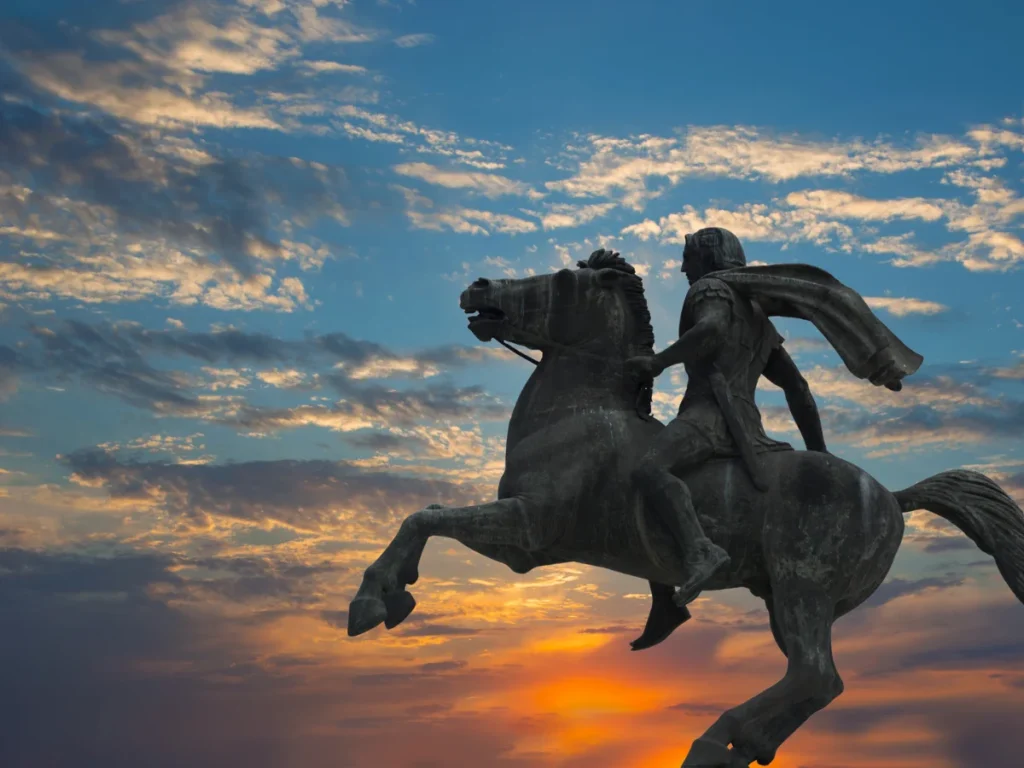Alexander the Great
Alexander the Great, born in Pella in 356 BCE, was the son of King Philip II. He is a legendary figure in history who left an indelible mark as one of the greatest military tacticians and conquerors. His ambition knew no bounds as he forged an empire spanning three continents. Alexander’s military brilliance, influenced by Aristotle’s teachings, forever changed the course of history. His legacy remains a testament to the audacity and vision of a young king who dreamed of conquering the world.

Childhood & Family
Since the dawn of time, Greece has gifted the world with many legendary figures, but among them, Alexander the Great stands as one of the most captivating. This royal tale unsurprisingly begins in the ancient city of Pella. For those visiting this historic location, its ancient stones whisper a thrilling narrative.
Born in 356 BCE, Alexander was the son of Philip II, the King of Macedonia, and his enigmatic wife, Queen Olympias. From an early age, he was surrounded by royal splendor, but his childhood wasn’t solely gilded. Firstly, thanks to his father’s towering ambitions, Alexander quickly became familiar with the games of war and politics. Additionally, having Aristotle as his tutor, he was swiftly imbued with knowledge that would prepare him for the conquests he’d later undertake.
However, not everything was peaceful in the royal palace. Although Alexander was destined to inherit the throne, his relationship with his father was tense. On the other hand, his bond with his mother, Olympias, ran deeper. It was often recounted that Olympias convinced her son of his divine origin, reinforcing his belief in his own greatness. This close tie to his mother would later influence many of his decisions as a ruler.
Education
Alexander the Great’s education stands out, primarily due to his renowned tutor, Aristotle. Initially, as a budding prince in Macedonia, Alexander absorbed an education suitable for a throne’s heir. Interestingly, his educational journey took a significant turn when his father, King Philip II, appointed the illustrious philosopher Aristotle as Alexander’s personal tutor at the age of 13. Over the course of the next three years, Aristotle not only imparted lessons on philosophy, politics, arts, literature, and science but also significantly deepened Alexander’s grasp of Greek culture and thought.
Furthermore, beyond his academic pursuits, Alexander dove into rigorous military training. From the outset, the young prince acquainted himself with the strategies and tactics of the Macedonian army. He honed skills in horsemanship, fencing, and hunting, which became essential for a Macedonian royal. Moreover, Alexander’s innate leadership abilities and tactical acumen became evident early on. Under the direct mentorship of his father, he engaged in several military campaigns, amassing invaluable on-ground experience.
In conclusion, blending the intellectual guidance from Aristotle with hands-on military training, Alexander geared up for his monumental conquests, solidifying his place as one of history’s eminent leaders.
Becoming King & Uniting Greece
Alexander the Great’s ascent to the throne and his subsequent unification of Greece remain monumental feats in history. Initially, upon the assassination of his father, King Philip II, in 336 BCE, Alexander immediately seized the Macedonian throne. Recognizing the internal threats, he acted swiftly to suppress all rebellions and potential usurpers within his kingdom.
Subsequently, with Macedonia firmly under his control, Alexander turned his gaze towards the fragmented city-states of Greece. Although his father had made strides in bringing many Greek city-states under Macedonian influence through the Corinthian League, unity remained elusive. Nevertheless, Alexander, with his unparalleled military tactics and diplomatic strategies, managed to assert Macedonian dominance over these states.
Moreover, in 335 BCE, when Thebes revolted against his rule, Alexander didn’t waste time. He razed the city to the ground, a decisive action which simultaneously demonstrated his might and served as a warning to other city-states contemplating rebellion. This strategy, while brutal, effectively deterred other potential revolts and cemented Macedonian supremacy throughout Greece.
Consequently, with a united front at his back and the combined strength of Greece under his banner, Alexander set his sights on a larger prize: the vast Persian Empire. His early achievements in Greece not only bolstered his confidence but also provided a unified base for his ambitious campaign against the Persians. Thus, laying the foundation for what would become one of the most legendary military campaigns in history.
Wars with the Persians
Alexander the Great’s campaigns against the colossal Persian Empire stand as testament to his military genius and relentless ambition. These campaigns, commonly known as the Wars of Alexander the Great, stretched from 334 BCE to 326 BCE and saw the young Macedonian king face seemingly insurmountable odds.
Battle of Granicus
Initially, when Alexander launched his campaign in 334 BCE at the Battle of Granicus, many saw his ambitions as pure folly. The Persian Empire, sprawling from Egypt to India, dwarfed the united Greek states both in territory and resources. However, at Granicus, Alexander showcased one of his hallmark tactics: the use of companion cavalry to deliver deadly hammer-and-anvil charges against the enemy. Moreover, he personally led the charge, a testament to his frontline leadership style. The Macedonians won the day, marking their first significant victory against Persia.
Battle of Issus
Following this momentum, Alexander led his forces into the heart of Asia Minor. Yet, it was at the Battle of Issus in 333 BCE that Alexander faced his true test. Confronting King Darius III himself, who commanded an army much larger than Alexander’s, the odds seemed heavily stacked against the Macedonians. Despite the numbers, Alexander implemented a brilliant tactical maneuver. Recognizing the importance of terrain, he used the narrow battlefield to neutralize the numerical advantage of the Persians. Furthermore, his decisive cavalry charge against the Persian center caused chaos, compelling Darius to flee and resulting in a significant victory for Alexander.
Battle of Tyre
The young king’s ambitions did not stop there. Subsequently, he set his eyes on the jewel of the Persian Empire: the city of Tyre. This coastal city, seemingly impregnable due to its island location and fortified walls, posed a major challenge. Undeterred, Alexander employed a mixture of audacity and engineering prowess. Over the course of several months, his men constructed a causeway to the island. Simultaneously, his navy, bolstered by ships from Greek city-states, blockaded Tyre from the sea. The combined land and naval assault eventually led to the city’s fall.
Now, with Tyre in his hands, Egypt willingly opened its gates to Alexander, viewing him as a liberator from Persian rule. Here, he founded the city of Alexandria, which would become one of antiquity’s greatest cities. However, the Persian Empire still loomed large, and its heart, Persepolis, awaited.
Battle of Gaugamela
In 331 BCE, the two great armies clashed again at Gaugamela. Darius, having learned from his previous encounters, came prepared with a vast force and chariots equipped to break the Macedonian phalanx. Yet, Alexander, ever the tactician, used diversionary tactics to create gaps in the Persian lines. Seizing the opportunity, he led a cavalry charge that punched through the Persian center. Darius fled once more, and the road to Persepolis lay open.
Upon reaching Persepolis, Alexander made a symbolic gesture by burning the palace, possibly as revenge for the Persian invasion of Greece years prior. With this act, the Macedonian king signaled the end of the Persian Achaemenid Empire.
Consequently, as the dust settled, it became clear that Alexander’s success against the Persians was not just a result of superior tactics and strategy. His leadership, charisma, and the indomitable spirit of his troops played pivotal roles. Against all odds, and facing an empire that had stood for over two centuries, Alexander achieved what seemed impossible. Ultimately, his campaigns against Persia became the stuff of legends, laying the groundwork for the Hellenistic civilization and forever changing the course of history.



Death of Alexander the Great
Alexander the Great’s death in 323 BCE in Babylon remains one of history’s most enduring mysteries. His sudden and unexpected demise at the age of 32 plunged the vast empire he had built into a tumultuous period of infighting and fragmentation.
Initially, during his stay in Babylon, signs of Alexander’s declining health became evident. He attended several feasts and drank copiously. After one particular banquet, he reported severe pain and, subsequently, fell ill. His condition deteriorated rapidly over the next twelve days. Throughout this period, his loyal generals and friends surrounded him, anxiously waiting for signs of recovery. However, despite their hopes, the great conqueror succumbed to his illness.
Following his death, numerous theories and speculations arose about its cause. Some believed that poison, administered by his rivals, had brought down the great king. Nevertheless, the slow progression of his illness seemed to contradict the idea of poisoning, which would typically act faster. Moreover, Alexander’s stature and the loyalty he commanded made the idea of someone getting close enough to poison him a risky proposition.
Another theory postulated that a relapsing fever, caused by the West Nile virus, might have led to his death. Additionally, others have speculated that autoimmune disorders or acute pancreatitis could explain the symptoms he exhibited in his final days. Despite the myriad of theories, no conclusive evidence exists to pinpoint the exact cause of his death.
Consequently, in the wake of his untimely demise, a power vacuum emerged. His vast empire, which stretched from Greece to India, did not have a clear successor. Thus, the Wars of the Diadochi, or the Wars of Alexander’s Successors, began, as his generals vied for control. These conflicts would last for decades, leading to the carving up of his empire among them.
In conclusion, Alexander’s death not only marked the end of an era of unparalleled conquests but also set the stage for a new epoch in which his former territories would evolve and develop independently. The mysteries surrounding his death, coupled with his legendary life, ensure that Alexander’s legacy continues to captivate historians and enthusiasts alike.
